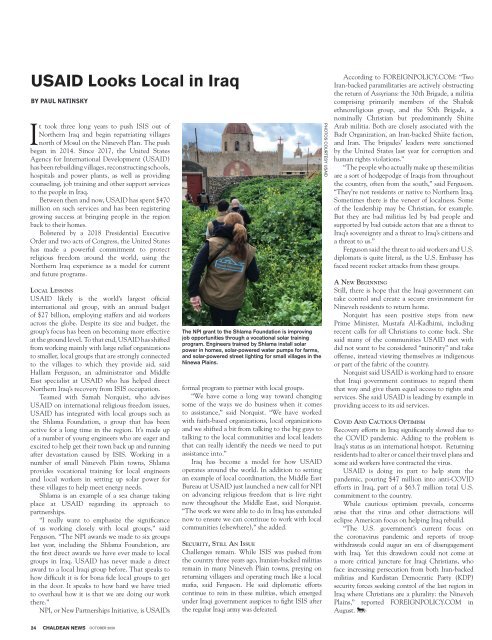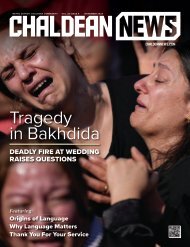OCTOBER 2020
Create successful ePaper yourself
Turn your PDF publications into a flip-book with our unique Google optimized e-Paper software.
USAID Looks Local in Iraq<br />
BY PAUL NATINSKY<br />
It took three long years to push ISIS out of<br />
Northern Iraq and begin repatriating villages<br />
north of Mosul on the Nineveh Plan. The push<br />
began in 2014. Since 2017, the United States<br />
Agency for International Development (USAID)<br />
has been rebuilding villages, reconstructing schools,<br />
hospitals and power plants, as well as providing<br />
counseling, job training and other support services<br />
to the people in Iraq.<br />
Between then and now, USAID has spent $470<br />
million on such services and has been registering<br />
growing success at bringing people in the region<br />
back to their homes.<br />
Bolstered by a 2018 Presidential Executive<br />
Order and two acts of Congress, the United States<br />
has made a powerful commitment to protect<br />
religious freedom around the world, using the<br />
Northern Iraq experience as a model for current<br />
and future programs.<br />
Local Lessons<br />
USAID likely is the world’s largest official<br />
international aid group, with an annual budget<br />
of $27 billion, employing staffers and aid workers<br />
across the globe. Despite its size and budget, the<br />
group’s focus has been on becoming more effective<br />
at the ground level. To that end, USAID has shifted<br />
from working mainly with large relief organizations<br />
to smaller, local groups that are strongly connected<br />
to the villages to which they provide aid, said<br />
Hallam Ferguson, an administrator and Middle<br />
East specialist at USAID who has helped direct<br />
Northern Iraq’s recovery from ISIS occupation.<br />
Teamed with Samah Norquist, who advises<br />
USAID on international religious freedom issues,<br />
USAID has integrated with local groups such as<br />
the Shlama Foundation, a group that has been<br />
active for a long time in the region. It’s made up<br />
of a number of young engineers who are eager and<br />
excited to help get their town back up and running<br />
after devastation caused by ISIS. Working in a<br />
number of small Nineveh Plain towns, Shlama<br />
provides vocational training for local engineers<br />
and local workers in setting up solar power for<br />
these villages to help meet energy needs.<br />
Shlama is an example of a sea change taking<br />
place at USAID regarding its approach to<br />
partnerships.<br />
“I really want to emphasize the significance<br />
of us working closely with local groups,” said<br />
Ferguson. “The NPI awards we made to six groups<br />
last year, including the Shlama Foundation, are<br />
the first direct awards we have ever made to local<br />
groups in Iraq. USAID has never made a direct<br />
award to a local Iraqi group before. That speaks to<br />
how difficult it is for bona fide local groups to get<br />
in the door. It speaks to how hard we have tried<br />
to overhaul how it is that we are doing our work<br />
there.”<br />
NPI, or New Partnerships Initiative, is USAIDs<br />
The NPI grant to the Shlama Foundation is improving<br />
job opportunities through a vocational solar training<br />
program. Engineers trained by Shlama install solar<br />
power in homes, solar-powered water pumps for farms,<br />
and solar-powered street lighting for small villages in the<br />
Ninewa Plains.<br />
formal program to partner with local groups.<br />
“We have come a long way toward changing<br />
some of the ways we do business when it comes<br />
to assistance,” said Norquist. “We have worked<br />
with faith-based organizations, local organizations<br />
and we shifted a bit from talking to the big guys to<br />
talking to the local communities and local leaders<br />
that can really identify the needs we need to put<br />
assistance into.”<br />
Iraq has become a model for how USAID<br />
operates around the world. In addition to setting<br />
an example of local coordination, the Middle East<br />
Bureau at USAID just launched a new call for NPI<br />
on advancing religious freedom that is live right<br />
now throughout the Middle East, said Norquist.<br />
“The work we were able to do in Iraq has extended<br />
now to ensure we can continue to work with local<br />
communities (elsewhere),” she added.<br />
Security, Still An Issue<br />
Challenges remain. While ISIS was pushed from<br />
the country three years ago, Iranian-backed militias<br />
remain in many Nineveh Plain towns, preying on<br />
returning villagers and operating much like a local<br />
mafia, said Ferguson. He said diplomatic efforts<br />
continue to rein in these militias, which emerged<br />
under Iraqi government auspices to fight ISIS after<br />
the regular Iraqi army was defeated.<br />
PHOTOS COURTESY USAID<br />
According to FOREIGNPOLICY.COM: “Two<br />
Iran-backed paramilitaries are actively obstructing<br />
the return of Assyrians: the 30th Brigade, a militia<br />
comprising primarily members of the Shabak<br />
ethnoreligious group, and the 50th Brigade, a<br />
nominally Christian but predominantly Shiite<br />
Arab militia. Both are closely associated with the<br />
Badr Organization, an Iran-backed Shiite faction,<br />
and Iran. The brigades’ leaders were sanctioned<br />
by the United States last year for corruption and<br />
human rights violations.”<br />
“The people who actually make up these militias<br />
are a sort of hodgepodge of Iraqis from throughout<br />
the country, often from the south,” said Ferguson.<br />
“They’re not residents or native to Northern Iraq.<br />
Sometimes there is the veneer of localness. Some<br />
of the leadership may be Christian, for example.<br />
But they are bad militias led by bad people and<br />
supported by bad outside actors that are a threat to<br />
Iraq’s sovereignty and a threat to Iraq’s citizens and<br />
a threat to us.”<br />
Ferguson said the threat to aid workers and U.S.<br />
diplomats is quite literal, as the U.S. Embassy has<br />
faced recent rocket attacks from these groups.<br />
A New Beginning<br />
Still, there is hope that the Iraqi government can<br />
take control and create a secure environment for<br />
Nineveh residents to return home.<br />
Norquist has seen positive steps from new<br />
Prime Minister, Mustafa Al-Kadhimi, including<br />
recent calls for all Christians to come back. She<br />
said many of the communities USAID met with<br />
did not want to be considered “minority” and take<br />
offense, instead viewing themselves as indigenous<br />
or part of the fabric of the country.<br />
Norquist said USAID is working hard to ensure<br />
that Iraqi government continues to regard them<br />
that way and give them equal access to rights and<br />
services. She said USAID is leading by example in<br />
providing access to its aid services.<br />
Covid And Cautious Optimism<br />
Recovery efforts in Iraq significantly slowed due to<br />
the COVID pandemic. Adding to the problem is<br />
Iraq’s status as an international hotspot. Returning<br />
residents had to alter or cancel their travel plans and<br />
some aid workers have contracted the virus.<br />
USAID is doing its part to help stem the<br />
pandemic, pouring $47 million into anti-COVID<br />
efforts in Iraq, part of a $63.7 million total U.S.<br />
commitment to the country.<br />
While cautious optimism prevails, concerns<br />
arise that the virus and other distractions will<br />
eclipse American focus on helping Iraq rebuild.<br />
“The U.S. government’s current focus on<br />
the coronavirus pandemic and reports of troop<br />
withdrawals could augur an era of disengagement<br />
with Iraq. Yet this drawdown could not come at<br />
a more critical juncture for Iraqi Christians, who<br />
face increasing persecution from both Iran-backed<br />
militias and Kurdistan Democratic Party (KDP)<br />
security forces seeking control of the last region in<br />
Iraq where Christians are a plurality: the Nineveh<br />
Plains,” reported FOREIGNPOLICY.COM in<br />
August.<br />
24 CHALDEAN NEWS <strong>OCTOBER</strong> <strong>2020</strong>

















